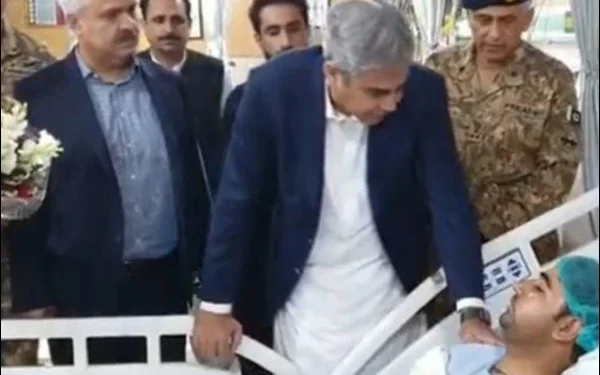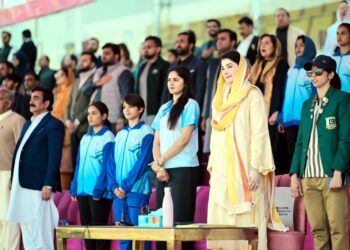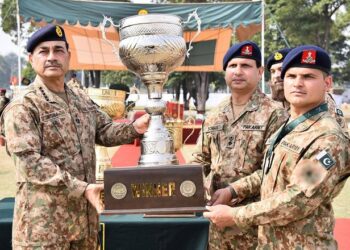Islamabad, Pakistan – In a powerful demonstration of national solidarity and support for the armed forces, Federal Interior Minister Mohsin Naqvi paid a visit to the Combined Military Hospital (CMH) in Bannu on Thursday to meet and personally inquire about the condition of the security personnel injured in a recent terrorist attack in North Waziristan. The attack, orchestrated by terrorists identified as members of Fitna-ul-Hindustan, left several brave members of Pakistan’s security forces wounded.
The visit, marked by heartfelt interactions and patriotic fervor, was aimed at boosting the morale of the injured personnel, recognizing their heroism, and reinforcing the government’s firm stance against terrorism. Also present on the occasion was Khyber Pakhtunkhwa’s Inspector General of Police, Zulfiqar Hameed, who joined the Interior Minister in meeting the wounded soldiers and acknowledging their unwavering service to the nation.
A Personal Gesture of Respect and Encouragement
Federal Minister Mohsin Naqvi’s visit to CMH Bannu was more than just a formal protocol—it was a symbolic act of solidarity with Pakistan’s security forces, especially those who have made immense sacrifices in the fight against extremism and militancy. As he went from bed to bed in the military hospital’s recovery wards, Naqvi personally spoke to each of the injured soldiers, listening to their stories, inquiring about their medical conditions, and offering prayers for their swift recovery.
Addressing the brave personnel, Naqvi said:
“Your courage has not only strengthened our resolve in the war against terrorism but has also filled our hearts with pride. You are the true sons of this soil, and your sacrifices will never be forgotten.”
He added that a nation with such valiant defenders could never be defeated, regardless of how malicious or persistent the enemy might be.
Recognition of Bravery and High Morale
During his visit, Mohsin Naqvi was deeply moved by the high morale and determination displayed by the injured soldiers. Despite the pain and trauma of their injuries, many of the personnel expressed a desire to return to the battlefield once they had recovered.
The Interior Minister commended this spirit, stating:
“Seeing your courage and resilience firsthand reminds us of the immense sacrifices made by our armed forces. You are not only protecting our borders, but also the soul of our nation.”
This powerful message was meant not just for those present in the hospital, but for all members of Pakistan’s security institutions who stand guard against threats to peace and national sovereignty.
Context: The Terrorist Attack in North Waziristan
The visit came in the wake of a cowardly terrorist attack in North Waziristan, a region that has historically witnessed intense conflict due to its proximity to the Afghan border and its strategic importance in counter-terrorism operations.
The militants, affiliated with the Fitna-ul-Hindustan network—a term increasingly used by officials to describe India-sponsored or India-linked terrorist proxies—launched a surprise attack on a convoy of security forces operating in the region. The incident resulted in injuries to multiple soldiers, some of whom were critically wounded.
Although swift retaliation by the forces minimized further damage and reportedly neutralized several assailants, the incident served as a reminder of the ongoing challenges faced in fully eradicating terrorism from the tribal belt.
National Resolve Against Terrorism
Interior Minister Naqvi reiterated the government’s unwavering commitment to eliminating terrorism from Pakistan. He emphasized that such attacks, no matter how brutal or sudden, would never shake the nation’s resolve.
“This cowardly attack will not deter us. Instead, it has only made our determination stronger. We will continue to fight till the last trace of terrorism is wiped out from our land,” he asserted.
His statement echoed the long-standing resolve of the Pakistani state, which has endured two decades of counter-terrorism operations, from Operation Zarb-e-Azb to Operation Radd-ul-Fasaad, aimed at dismantling terror networks and restoring peace, especially in the tribal areas and bordering regions.
IG Zulfiqar Hameed Also Praises Injured Soldiers
Alongside the Interior Minister, Inspector General of Police Khyber Pakhtunkhwa Zulfiqar Hameed also visited the wounded personnel and expressed his admiration for their bravery. Speaking to the media briefly after the visit, IG Hameed said:
“These men are the pride of our nation. Their courage under fire and unwavering dedication to duty are examples for all of us. The police and military stand united in our fight against terrorism.”
He also highlighted ongoing efforts to strengthen intelligence sharing, surveillance, and law enforcement cooperation in Khyber Pakhtunkhwa, which remains a critical front in the broader fight against militancy.
Nationwide Support for the Armed Forces
The visit by high-ranking government officials to CMH Bannu comes at a time when public sentiment is firmly behind the security forces. Social media platforms were flooded with tributes to the injured soldiers, with citizens across Pakistan expressing admiration, posting prayers, and reaffirming their support for the armed forces using hashtags like #SaluteOurHeroes, #PakistanFightsTerror, and #DefendersOfPakistan.
The government has also promised comprehensive medical care and rehabilitation for the injured personnel, with CMH facilities in Peshawar and Rawalpindi on standby for cases that require advanced treatment.
Reinforcing Civil-Military Unity
The Interior Minister’s hospital visit was also a reflection of growing civil-military cooperation in Pakistan’s internal security framework. Over the past several years, the Pakistani government has worked closely with the armed forces to modernize counter-terrorism operations, build border fencing with Afghanistan, and implement deradicalization programs in former conflict zones.
By standing beside the injured soldiers, Mohsin Naqvi sent a strong message of unity and commitment — that Pakistan’s political and security leadership are on the same page when it comes to safeguarding the nation’s peace and sovereignty.
Moving Forward: The Path to Lasting Peace
While Pakistan has made significant strides in its war against terrorism, attacks such as the one in North Waziristan serve as a reminder that the struggle is far from over. Analysts and security experts continue to stress the importance of:
- Enhanced intelligence coordination
- Modernized border control and surveillance
- Community engagement in tribal areas
- Socio-economic development in conflict-prone regions
These strategies, when combined with unshakable resolve and national unity, are crucial in preventing the resurgence of militant elements and ensuring long-term peace in Pakistan.
Conclusion: A Nation United Against Terrorism
Interior Minister Mohsin Naqvi’s visit to CMH Bannu was a poignant and powerful gesture that reaffirmed national unity, respect for the armed forces, and the government’s unwavering stance against terrorism. By standing beside the injured soldiers, praising their valor, and vowing to continue the fight against extremism, the Interior Minister not only uplifted spirits within the hospital wards but also sent a clear message across the nation — Pakistan will never bow to terror.
As Pakistan continues to march toward peace and stability, the sacrifices of its brave sons—soldiers, officers, and law enforcement personnel—will remain the foundation of the country’s strength and resilience. The visit to CMH Bannu is a reminder that the nation stands tall behind its heroes, united and resolute in the face of all threats.
























